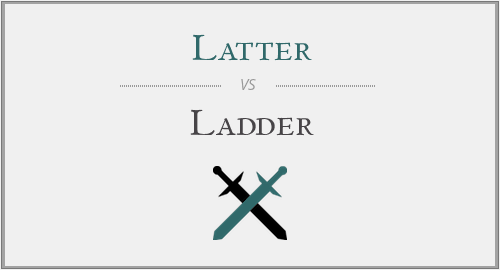Does one doubled letter hold the power to change the entire meaning of a word? Yes, it does. A perfect example to show this is the pair of words "latter" and "ladder". Spelled almost identically, with only one consonant looking different inside the words, they often create confusion amongst English users, causing errors in English grammar.
No, you cannot replace "latter" with "ladder". Never. If you do, it will certainly be a misspelling and it will change the meaning of your message, because "latter" and "ladder" have so distinct definitions. Check them quickly below so you remember what each word stands for and why you can never confuse them!
Latter vs. Ladder
No, it is not that British prefer one form and Americans prefer the other form, even though basically they mean the same thing. They do not. "Ladder" is an object, a piece of equipment used in constructions or homes to reach higher spots.
"Latter", on the other hand, is most commonly used as a formal adjective, placed in front of a noun, referring to the second half or the last time/days/months of a period. You can see more about how "latter" is used correctly in the examples provided below.
When do we use "latter"?
"Latter" is basically an adjective, always placed before a noun, generally one referring to a time period. It is used in formal conversations, to define the time near the end of a period. But you will also often meet the word in the structure "the latter". In this case, it becomes a noun and it refers to the second of two elements (people, objects, things) that have been just mentioned in the current or previous sentence (or that have been just talked about).
Example 1: The latter half of the nineteenth century brought a lot of changes in people's lives. - "latter" is a formal adjective referring to the period next to the end, the second half, of the nineteenth century.
Example 2: Between more free time and more money, the manager chose the latter. - "latter", as a noun, is a synonym for "the second", or "the last one".
When do we use "ladder"?
This one is a lot easier to remember than "latter". "Ladder" is a basic noun in English, defining a piece of equipment, usually made out of a resistant material (wood, metal, steel), with short steps that are fixed between two long sides, on which one climbs in order to reach higher places.
Example: Her grandmother was short, so every time she wanted to reach the upper shelf of the wardrobe, she had to climb on a ladder. - "ladder" defines a piece of equipment used by people to reach high places.
Conclusion
Even though it's just a double letter that looks different, it changes everything about "latter" and "ladder". These words are never to be confused, just as you can't confuse them with "later" or "leather" either, even though all these four words seem to be pronounced the same. Remember the explanations above and not spelling "latter" and "ladder" wrong will come simply and naturally for you!









Have a discussion about this article with the community:
Report Comment
We're doing our best to make sure our content is useful, accurate and safe.
If by any chance you spot an inappropriate comment while navigating through our website please use this form to let us know, and we'll take care of it shortly.
Attachment
You need to be logged in to favorite.
Log In